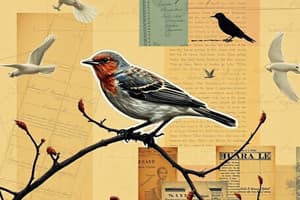Podcast
Questions and Answers
What other rough thing does Jem do when Mrs. Henry Lafayette Dubose pushes him too far?
What other rough thing does Jem do when Mrs. Henry Lafayette Dubose pushes him too far?
He roughs up Scout by yanking her hair and pushing her.
What was Jem's punishment for destroying Mrs. Dubose's flowers?
What was Jem's punishment for destroying Mrs. Dubose's flowers?
His punishment was to read to Mrs. Dubose for two hours every day for a month.
What does Atticus mean when he says it's never an insult to be called what somebody thinks is a bad name?
What does Atticus mean when he says it's never an insult to be called what somebody thinks is a bad name?
He means that bad words and insults tell more about the person rather than the victim.
Why does Mrs. Dubose keep the children a few minutes longer each day?
Why does Mrs. Dubose keep the children a few minutes longer each day?
In what ways was Mrs. Dubose heroic?
In what ways was Mrs. Dubose heroic?
What commonality do Boo Radley, Atticus, and Mrs. Dubose share?
What commonality do Boo Radley, Atticus, and Mrs. Dubose share?
Record a simile from this chapter.
Record a simile from this chapter.
What is the best line in the chapter, and why?
What is the best line in the chapter, and why?
Study Notes
Jem's Outburst
- Jem loses control after being provoked by Mrs. Dubose, leading to him destroying her flowers and pushing Scout.
- In his anger, Jem also yanks Scout's hair, demonstrating his emotional turmoil.
- This incident highlights Jem’s deep loyalty to his father and the limits of his patience.
Jem's Punishment
- Jem is assigned to read to Mrs. Dubose for two hours daily over a month as punishment for his actions.
- This punishment is deemed suitable, serving as an alternative to more traditional forms of discipline.
Atticus on Insults
- Atticus explains to Scout that insults reflect poorly on the person using them, not the one targeted.
- He emphasizes that foul names held no power and are indicative of the speaker's character.
- An example from personal experience illustrates that negative comments often reveal the critic's true nature.
Mrs. Dubose's Struggle
- Mrs. Dubose extends the children's reading sessions as a means to cope with her morphine addiction.
- She aims to distract herself from her cravings, gradually increasing her ability to resist the drug.
Heroism of Mrs. Dubose
- Mrs. Dubose is portrayed as heroic for facing her addiction despite knowing she may not overcome it.
- Her determination to conquer a personal battle represents a form of courage and resilience.
Shared Qualities of Boo, Atticus, and Mrs. Dubose
- Boo Radley, Atticus Finch, and Mrs. Dubose share the trait of challenging societal norms in Maycomb.
- Each character embodies positive attributes that contrast with the prevailing attitudes of the community, offering valuable lessons to the children.
Similes in the Chapter
- Notable similes include “His voice was like the winter wind” and “You look like a picture this evening,” enriching the narrative's descriptive quality.
Key Line Reflection
- The statement "before I can live with other folks, I've got to live with myself" emphasizes the importance of individual conscience over public opinion.
- This line underscores central themes in the story related to integrity and moral conviction.
Studying That Suits You
Use AI to generate personalized quizzes and flashcards to suit your learning preferences.
Description
This quiz examines key moments in 'To Kill a Mockingbird' involving Jem, Mrs. Dubose, and Atticus. Explore Jem's emotional outburst, his punishment, and the lessons Atticus imparts about character and resilience. Test your understanding of the implications of their actions and relationships.




